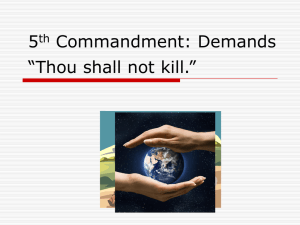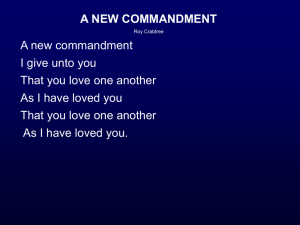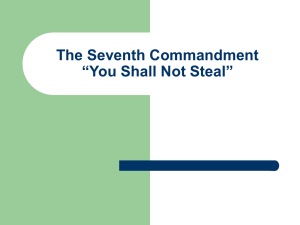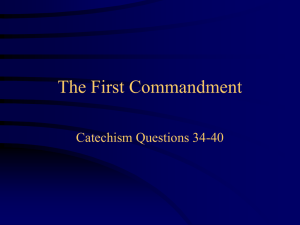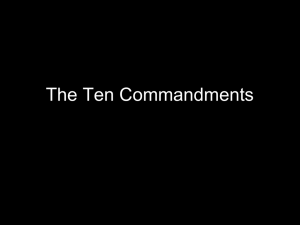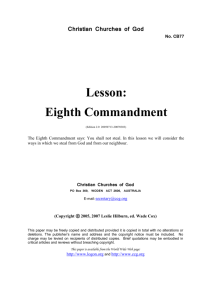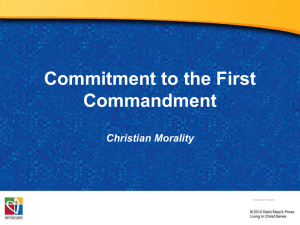Robert Morris, a principal founding father of the United States
advertisement
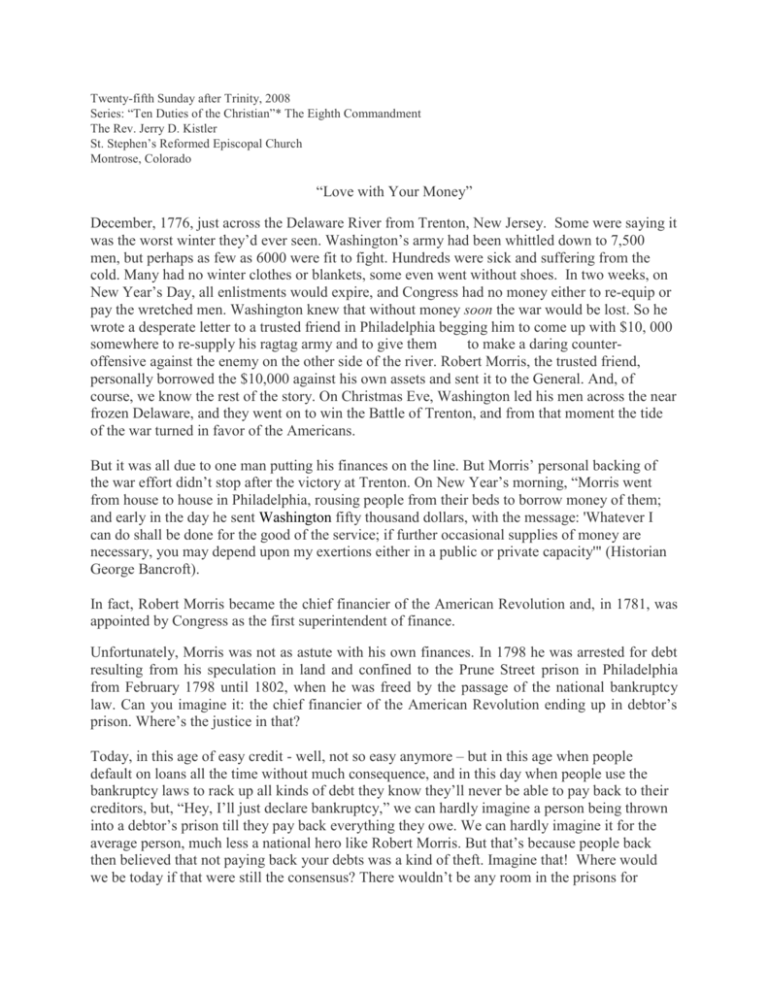
Twenty-fifth Sunday after Trinity, 2008 Series: “Ten Duties of the Christian”* The Eighth Commandment The Rev. Jerry D. Kistler St. Stephen’s Reformed Episcopal Church Montrose, Colorado “Love with Your Money” December, 1776, just across the Delaware River from Trenton, New Jersey. Some were saying it was the worst winter they’d ever seen. Washington’s army had been whittled down to 7,500 men, but perhaps as few as 6000 were fit to fight. Hundreds were sick and suffering from the cold. Many had no winter clothes or blankets, some even went without shoes. In two weeks, on New Year’s Day, all enlistments would expire, and Congress had no money either to re-equip or pay the wretched men. Washington knew that without money soon the war would be lost. So he wrote a desperate letter to a trusted friend in Philadelphia begging him to come up with $10, 000 somewhere to re-supply his ragtag army and to give them to make a daring counteroffensive against the enemy on the other side of the river. Robert Morris, the trusted friend, personally borrowed the $10,000 against his own assets and sent it to the General. And, of course, we know the rest of the story. On Christmas Eve, Washington led his men across the near frozen Delaware, and they went on to win the Battle of Trenton, and from that moment the tide of the war turned in favor of the Americans. But it was all due to one man putting his finances on the line. But Morris’ personal backing of the war effort didn’t stop after the victory at Trenton. On New Year’s morning, “Morris went from house to house in Philadelphia, rousing people from their beds to borrow money of them; and early in the day he sent Washington fifty thousand dollars, with the message: 'Whatever I can do shall be done for the good of the service; if further occasional supplies of money are necessary, you may depend upon my exertions either in a public or private capacity'" (Historian George Bancroft). In fact, Robert Morris became the chief financier of the American Revolution and, in 1781, was appointed by Congress as the first superintendent of finance. Unfortunately, Morris was not as astute with his own finances. In 1798 he was arrested for debt resulting from his speculation in land and confined to the Prune Street prison in Philadelphia from February 1798 until 1802, when he was freed by the passage of the national bankruptcy law. Can you imagine it: the chief financier of the American Revolution ending up in debtor’s prison. Where’s the justice in that? Today, in this age of easy credit - well, not so easy anymore – but in this age when people default on loans all the time without much consequence, and in this day when people use the bankruptcy laws to rack up all kinds of debt they know they’ll never be able to pay back to their creditors, but, “Hey, I’ll just declare bankruptcy,” we can hardly imagine a person being thrown into a debtor’s prison till they pay back everything they owe. We can hardly imagine it for the average person, much less a national hero like Robert Morris. But that’s because people back then believed that not paying back your debts was a kind of theft. Imagine that! Where would we be today if that were still the consensus? There wouldn’t be any room in the prisons for murderers or rapists. And although the debtor’s prisons arguably became a perversion of justice, the basic idea that a thief should pay back everything he owes and then some, even to the point that, if he doesn’t have the where-withal to so, he should be made an indentured servant – a debtor-slave – till he makes full restitution, that idea comes directly from the Bible. In Exodus chapter 22 we read, “If a man steals an ox or a sheep, and slaughters or sells it, he shall restore five oxen for an ox and four sheep for a sheep…. He should make full restitution; if he has nothing, then he shall be sold for his theft.” (vv. 1, 3). Now it’s not my point that we need to reestablish debtor’s prisons or reinstitute the practice of indentured servitude, but it is my point that God takes very seriously the crime of theft, whether it’s the outright act of stealing, or the none-payment of debts. God said in the 8th Commandment, “Thou shalt not steal,” and in saying that – think about it God was declaring that He is for private property. Private property is a biblical concept. It is not a right that is given to us by the State; it is a right given to us by our Creator. And in the 8th Commandment, God upholds the sanctity of private property (if one can say it that way). If God makes it a crime to take something that belongs to another, then surely God is saying that the victim has a right to own what was unlawfully taken. In biblical times, a person’s property was his very life. There was not such thing as insurance, or Social Security, or the FDIC that would guarantee your money. No. In a pastoral society like the one God originally gave His Ten Commandments to, shepherds and ranchers, and all the many people in their households, depended on their livestock for their very survival. And so to steal someone else’s property was to threaten that person’s very life. This is why the thief didn’t just owe what we call “distributive justice” – an ox for an ox, or a sheep for a sheep – but “retributive justice” – five oxen for one ox, and four sheep for one sheep. In other words, full restitution and then some. And if the thief couldn’t pay, then he was made an involuntary employee of the victim till he paid the whole debt. And so the first principle we see in the 8th Commandment - not to steal - is that it is really an extension of the 6th Commandment – ‘Thou shalt do no murder.” Property is an extension of a person’s life. And therefore to take someone’s property is in a very real sense to take away part of his life. And since all lives have been made in the image of God, to attack a person’s property is to attack God Himself. Do you follow that logic? The first principle is that the 8th Commandment is an extension of the 6th. The second principle is like the first: God has given each of us every thing we have, and reality it all belongs to God anyway. Therefore to take another’s property is to steal not only from your neighbor, but from the God whose gifts they are. Okay? Do you follow that logic? That’s why God thinks stealing is such a serious business. It’s stealing a portion of a person’s life, and it’s ultimately stealing from God. Now remembering that everything we have is a gift from God, and that it really belongs to God, and is only “on loan” to us to use as His good stewards, that brings us to our first application of the 8th Commandment. And that is that, first and foremostly, we should never steal from God. That sounds obvious, but I think we wonder, “How is it possible to steal from God?” Well, that was almost the exact question God’s people asked in the last book of the Old Testament. In Malachi chapter 3, God asks His people: “Will a man rob God? Yet you have robbed Me! But you say, ‘In what way have we robbed You?’ In tithes and offerings [, God answers. “That’s how you’ve robbed Me. This is why] you are cursed with a curse, for you have robbed Me, even this whole nation.” God says here that His people had stolen from Him by withholding from Him the portion that belonged to Him of all the things He’d given them, by not given Him their tithes. Now I know what some of you are thinking: “Oh no! He’s going start preaching to us about tithing. He’s gonna tell us we’d all better start giving 10% of our wages or God’s not going to be pleased with us. Don’t start preaching about tithing; we’ve heard that all before.” Or, “Don’t start preaching about tithing; you’re going to offend someone.” The problems is, I don’t have the right to take things out of the Bible. Our opponents in that other church, which will remain un-named, feel they can take things out of the Bible as they please, but I can’t. And I’m called to preach the whole counsel of God, not just the parts of the Bible that make us feel good. So I am going to talk to you about tithing. God does says in this passage that we are stealing from Him if we do not give Him the portion that belongs to Him of all of the good things He’s given us. Now as a young man, I’ll confess to you that I really struggled with this. As a starving college student I felt I couldn’t tithe. I had too many expenses, and not enough income. But I’ll tell you this: it was during that time in my life that I really learned the blessing of tithing. Before I tithed, it always seemed like I was only ever just scraping by. But then when I made the commitment to tithe, because as a Bible major I knew that’s what God’s Word called me to do, I suddenly had enough money to meet my expenses and to spare. I wasn’t getting rich, by any stretch of the imagination, but I wasn’t coming up short. And this is just as God promised. I want you to know that this passage from Malachi is the one place is all of Scripture that God tell us to test Him – to put Him to the test – and it’s in regard to tithing. For God goes on to say, “Bring all the tithes into my storehouse, that there may be food in My house, and try Me now in this [test Me, put ME to the test]… if I will not open for you the windows of heaven and pour out for you such blessing that there will not be room enough to receive it” (vv. 8-10). You see, the reason we struggle with tithing is that we feel we’re going to lose something if we do. But it’s just the opposite. We lose is we don’t tithe. That’s why God’s people were suffering a curse. They didn’t have because they’d withheld from God. But God has promised to give us more if we do. The question is: Do we believe God? Do we trust God, or do we trust our money? That’s the real question. How is our real God? You see, how you deal with your money is where the rubber of you faith really hits the road. Now many of us are really struggling financially the way this economy is going. Some of you have been hit really hard by the crash of the stock market. Does God understand that we have to pay our bills? Does God understand that we have to put food on the table for our kids? Does God understand that that means we can’t always give the full tithe of our income? I think He does. But I’ll tell you what He doesn’t understand: that’s when we put Him at the bottom of the budget and give Him what’s left over only after we’ve spent most of our money on a bunch of frivolous things. That’s what He doesn’t understand. And that’s when we steal from God. We should put God at the top of the budget, and then, from what remains after that, to do whatever it is we want to do with our money. And, you see, the promise is if we do it that way, we will have more to do with whatever it is we want to do with our money. But let’s just always remember what a gracious thing it is that God only requires a tenth. It all belongs to Him. He could require it all. But he only requires a tithe. And that brings us to our second application of the 8th Commandment. And that is that it’s just as much a violation of the 8th Commandment to give to God so excessively that we unable to our responsibilities to others. In other words, that we love God to the exclusion of love to our neighbors. That’s what the Pharisees were doing. They were honoring God with their finances to the injury of their families. And Jesus said that too was a violation of God’s commandments. In Matthew 15, Jesus says to the Pharisees, “Why do you also trespass the commandment of God because of your tradition? For God commanded, saying, ‘Honor your father and your mother’; and , ‘He who curses father and mother, let him be put to death.’ But you say, ‘Whoever says to his father and mother, “Whatever profit you might have received from me is a gift of God” – then he need not honor his father or mother.’ Thus you have made the commandment of God of no effect by your tradition.” You see, we can’t be so “religious,” so dedicated to honoring God that we dishonor our neighbors, in this case our families. That’s a disconnect. We love God by loving our neighbors, by loving our families, and vice versa. So in I Timothy, 5 St. Paul lays down for us our responsibilities financially to our families. He says. “If any widow has children or grandchildren, let them first learn to show piety at home and to repay their parents… But in anyone does not provide for his own, and especially for those of his own household, he has denied the faith and is worse than an unbeliever.” Not providing for our families, when we have the means to do so, is a kind of apostasy, Paul says. It’s stealing. It’s another way we can violate the 8th Commandment. We’ve heard all along in this series that love is the fulfilling of the law. And it is again for this commandment. To love our neighbors as ourselves with our money is the way we fulfill the 8th Commandment. St. John writes, “By this we know love, because He laid down His life for us. And we also ought to lay down our lives for the brethren.” And what’s the application? “Whoever has this world’s goods, and sees his brother in need, and shuts up his heart from him, how does the love of God abide in him?” (1 John 3:16-17) You see, we got to come to the point that we see our money as not a means for loving ourselves, but for loving one another. So we’ve go to love God with our money. We’ve got to love our families with our money. And we’ve got to love those around us who are in need with our money. And that’s how we fulfill the 8th Commandment. + *This series owes much to Michael Horton’s excellent book, The Law of Perfect Freedom, Moody Press, Chicago, 1993
